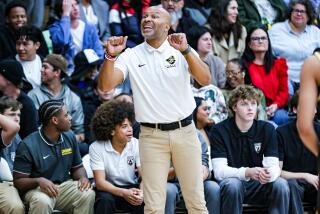AP Sports Editors Gather to Tackle Diversity of Problems
- Share via
DANA POINT — Thirty years ago, editors of the nation’s sports sections had a simple task: Report the results of professional and college games--maybe throw in a little golf or tennis or track and field on the side--and do so in an entertaining fashion. This was done by white males, and targeted for them.
But when 135 members of the Associated Press Sports Editors gather beginning today at the Dana Point Resort for their 21st national convention, the 3 1/2-day program will include sessions and workshops on an assault conspiracy case involving women’s figure skaters; a sensational double murder case centering on a revered football hero; diversifying both staffs and readership; sexual harassment in the newsroom, and communicating more effectively with employees.
There also will be discussions of writing, reporting and editing, and social functions. But the days when those were the dominant activities at an APSE convention are gone.
“Sports sections used to just go about presenting your typical menu of baseball, basketball and football and a bunch of local names,” said Paul Anger, sports editor of the Miami Herald, first vice president of APSE and the convention’s program chairman. “Now there are more sports and issues to cover and an increasingly diverse readership.
“There’s no such thing as a pat formula for producing a sports section anymore. What’s going to work in Miami isn’t going to work in Kansas City; what’s going to work in Los Angeles might not work in Washington, D.C.”
The convention, with The Times Orange County Edition as the primary sponsor, will be making its second Southern California appearance. It was in Santa Monica in 1983.
APSE was formed in the early 1970s by editors who were tired of the perception that they ran the newspaper’s “toy department” and were seeking ways to make their sections better and more ethical.
The organization has since grown to more than 550 members.
“APSE has increased awareness of ethical standards among sports editors and reporters,” said Dale Bye, the organization’s outgoing president and sports editor of the Kansas City Star. “It has raised the issues of diversity, both in staff hiring practices and in coverage and readership.
“I think it has just raised the standard for sports journalism in general.”
But the strides made have been mirrored by an increasingly complicated set of stories to cover; editors have had to keep running just to stay in place.
Among this week’s panels:
--In Pursuit of Tonya Harding: The session will focus on tactics used by reporters and editors in the wake of an attack on Nancy Kerrigan by men close to her figure skating rival, Harding. Some steps taken--such as a small group of reporters calling up Harding’s personal computer message list at the 1994 Winter Olympics in Lillehammer, Norway--have sparked debate within APSE. Mike Moran, director of public information and media relations for the U.S. Olympic Committee, is certain to take issue with some of the actions taken.
--Two discussions on diversity, one as it relates to hiring and the other to readers.
--A last-minute session, set for Saturday, to discuss the O.J. Simpson murder case and the coverage of it. Panelists will include Leo Wolinsky, Los Angeles Times metro editor, and Steve Bisheff, Orange County Register sports columnist.
Jimmy Johnson, outspoken former coach of the two-time Super Bowl champion Dallas Cowboys, will make Thursday’s keynote address. Johnson recently left the Cowboys and will go to work for the Fox network as an NFL analyst.
Friday, the APSE will honor Pulitzer Prize-winning columnist Dave Anderson with the Red Smith Award, named after Anderson’s late colleague at the New York Times. The award, given to an individual who has made major contributions to sports journalism, was first won by Smith in 1981. Los Angeles Times columnist Jim Murray won the following year.
Anderson’s career has spanned 43 years; he has been a New York Times columnist since 1971.
Convention sessions will be covered and presented in a daily report by this year’s members of the Freedom Forum Sports Journalism Institute, an intern program designed to attract students--particularly minorities and women--to print sports journalism.
More to Read
Go beyond the scoreboard
Get the latest on L.A.'s teams in the daily Sports Report newsletter.
You may occasionally receive promotional content from the Los Angeles Times.










